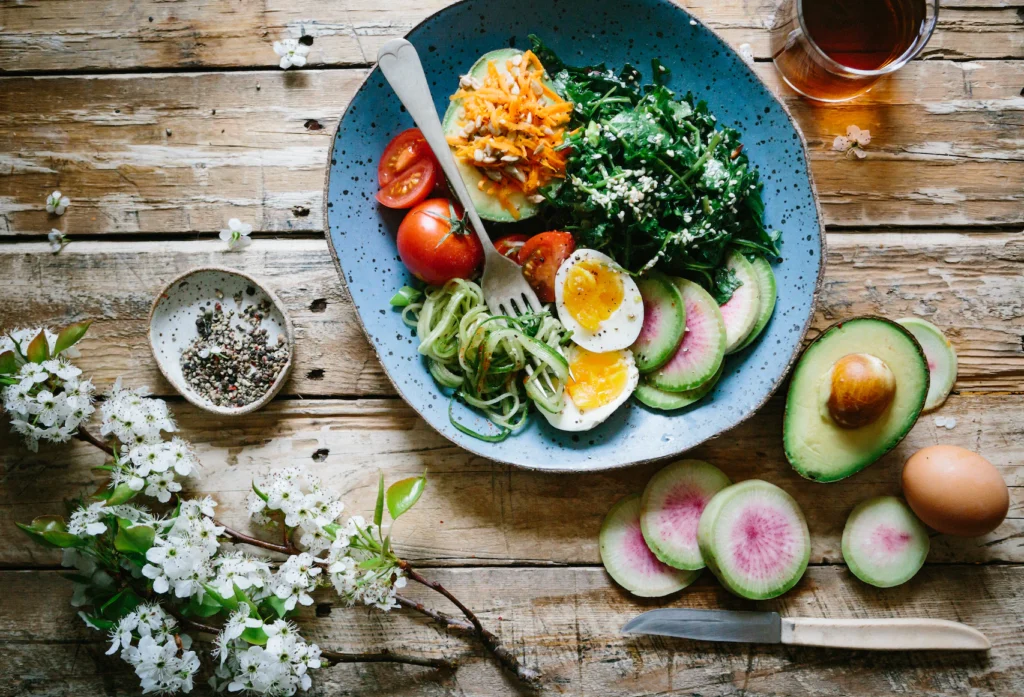Following the fundamentals of healthy eating is manageable for everyone. If you read the following rules and proceed from there, you are already doing the right thing.
Be active – move more, sit less
Gaining and losing energy mus be balanced. In order to do so, to maintain your metabolism and ensure good health, you should definitely exercise and reduce how much you sit down per day, especially in front of your various screens.
Start your day with breakfast
Breakfast should be enough to get a boost of energy for the day’s activities. The body has consumed the reserves of carbohydrates stored in the liver at night, and these need replenishment in the morning. If you don’t eat breakfast in the morning, the body will begin to decompose its reserves, which is why it is not as effective as it should be and thus your ability to work, study and focus will suffer. Carbohydrates obtained from breakfast will immediately be used and the body will not store them as fat. Breakfast should be rich in slow-burning carbohydrates. Various porridges, especially those made of whole grains, are well suited. Sandwiches, and even some treats, are also suitable.
Eat regularly
Arrange the rhythm of the day in a way that allows you to eat three times a day as regularly as possible, to avoid overeating due to a long gap between meals. Choose snacks such as fruits, vegetables, nuts, seeds and yogurt as option between meals. From the point of view of dental health, you should not eat more than five times a day. Keep in mind that even a cup of coffee, juice or a cookie between meals is already a meal. As the final solid meal depends on your bedtime, it should be around 6 p.m. to 7 p.m. It is not worth going to bed with a rumbling stomach, you can eat another snack (e.g vegetables) no later than a few hours before bedtime.
More high-fibre foods
In order to have enough fibre in your diet to maintain digestion, you need to eat grains as well as fruits, vegetables and berries. You should reduce the consumption of white flour and prefer more nutritious whole grain products rich in fibre. Use more buckwheat, groats and pearled grains, favour whole grain versions of regular pasta and rice, and use whole grain flour when baking. A good breakfast is porridge or whole grain flakes filled with high fibre.
Eat at least five handfuls of fruits and vegetables a day
Try to eat fruits and vegetables at every meal in order not to deprive the body of necessary vitamins and minerals. Half a plate should be composed of vegetables during lunch or dinner. Eat as many diverse crops and fruits as possible to et a variety of nutrients. Always take vegetables with the main dish, whether they are steamed, boiled, stewed or in the form of a salad. For dessert you should prefer foods made from fruits and berries. Although you can already get a small amount of vitamins and minerals from eating a few berries, fruits and vegetables should be eaten at least 500 grams in total per day to help prevent cardiovascular diseases or some forms of cancer.
Prefer fish over meat
Fish should be on the table 2-3 times a week, because fish contains Ω-3 fatty acids that are necessary for reducing the risk of developing many common diseases such as cardiovascular diseases. Fish is also an indispensable source of vitamin D, which in turn helps calcium to better absorb and thereby supports the health of bones. You should eat both red and white fish, but less canned fish and salted and smoked fish, because these contain a lot of salt. Depending on the fish, you should eat at least 200 grams of it per week.
Use fats wisely
The body needs fats, but in very large quantities. Therefore you should prefer steaming, boiling, stewing or baking food in the oven over frying it in lots of fat. In order to reduce the amount of saturated fatty acids in the food itself, remove the rind, visible fat and lard from the meat, and the skin from the chicken before cooking. Be aware of hidden fats that can be found in pastries and processed meat products. You should prefer oil when cooking. Diversify your choice of foods by adding nuts, almonds and seeds to them. Don’t be afraid of fish fat!
Less sugar
Added sugars are sugars that have been added to foods during food processing (they can be found in candies, pastries, carbonated drinks and juices, quark cream, yoghurts and in some meat products) or sugars that you have added yourself while cooking at home (e.g. in coffee, tea or dessert). You can get over 40 grams of added sugars from some quark cream cups or over 50 grams of added sugars from carbonated drinks that are 500 ml. When eating/drinking these types of products, you should not eat more sugar or other sweet things during the day. Remember that carbonated drinks do not quench thirst. The best thirst quencher is water. Instead of candies and cakes you should eat fresh or dried fruits.
Less salt
A large amount of excess salt comes inadvertently from canned and ready-to-eat foods. In reality we get a considerable amount of salt from everyday foods such as black bread, ham and cheese. To get less salt from foods, look for insipid alternatives and prefer foods made of fresh ingredients. When seasoning foods, use herbs instead of salt. Do not add more salt to the foods at the table.
Quench your thirst with water
Water is necessary for transporting nutrients and residues, the normal functioning of digestive juices and more. An adult human needs 28-35ml of water per kilogram, about 2-3 litres. If you eat normally, you’re able to get most of the fluids from foods such as fruits and vegetables and soups and drinks. An adult should drink 2-3 glasses of water a day, more during a hot weather and while moving. The best drink is pure water.
Don’t go overboard with alcohol
The metabolism of a human body does not need alcohol. Men should not drink over four units of alcohol and women over two units of alcohol per day. One unit is a quantity that contains 10 rams of absolute alcohol. At least three completely non-alcoholic days must remain in each week, even for these quantities. You should remember that in addition to other possible adverse effects, alcohol also provides a large amount of additional energy. For example, one unit of alcohol is approximately 4 cl of 40% strong alcohol or 12 cl of 12% wine; 0.5 l of beer (5.2%) is two units of alcohol.
Appreciate food
Learn to cook and enjoy it slowly, it’s even better with others. People who cook on their own usually eat healthier. Store-bought comfort foods that can be quickly put in your mouth often contain too much fat, sugar and/or salt, but little fibre, vitamins and minerals. An unhealthy diet is often a consequence of convenience and a busy lifestyle. Control over the quantities eaten is easily lost when eating quickly at the refrigerator or in front of the TV.
Written by the youth information portal Teeviit based on the source of the National Institute for Health Development.
The National Institute for Health Development is a public research and development institution which conducts research on public health, disease prevention programmes and activities and promotes health.
Published on the website of Teeviit in 2022.







